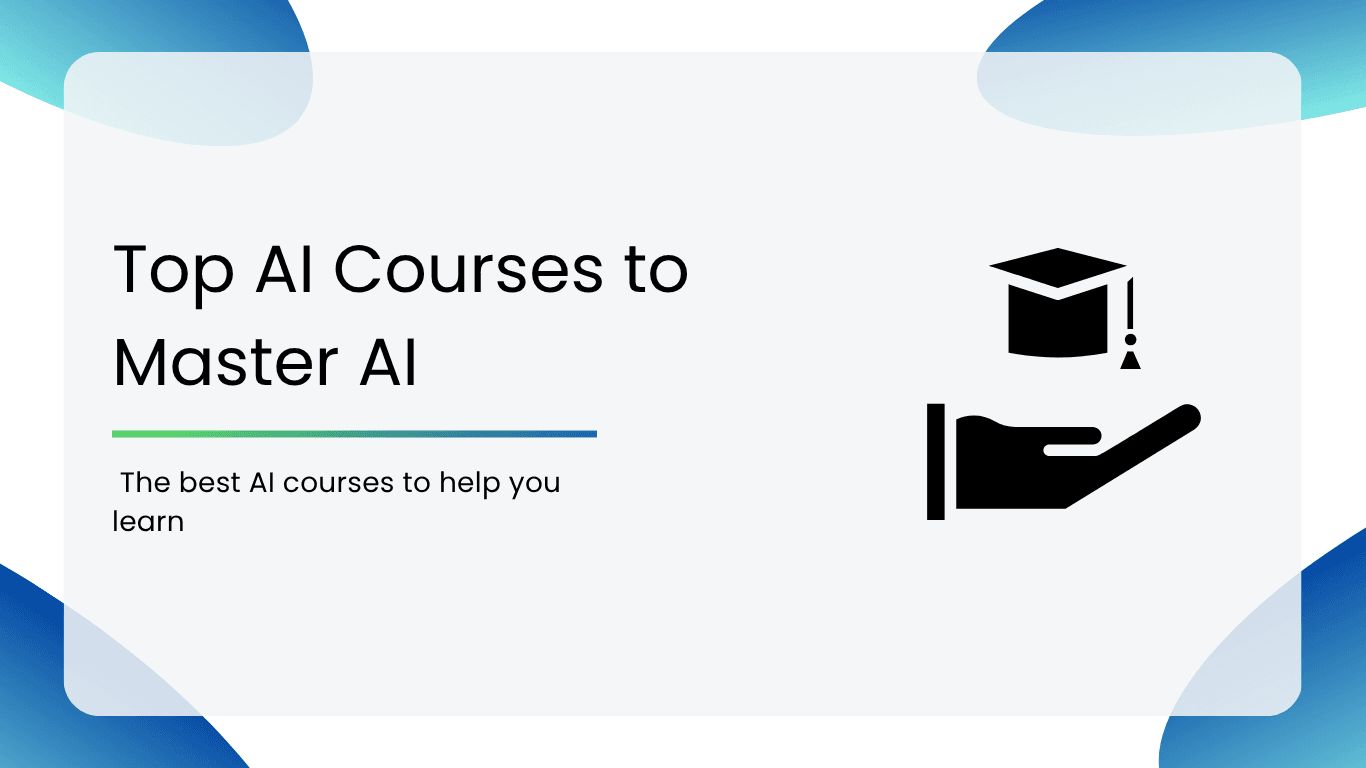Artificial Intelligence is revolutionizing industries, careers, and our daily lives, and getting ahead means learning from the best. Whether you’re starting from scratch or just need to upgrade your skills, the right AI course can make a huge difference.
In this blog, we have listed the best AI courses to help you learn machine learning, deep learning, LLM apps, and more. Ready to secure your skills for the future? Let’s start!
Why Do AI Courses Matter?
- Strong Demand for Employment: AI and machine learning skills are in high demand in today’s job market. Healthcare, finance, retail, and tech companies are struggling to find people who can design, deploy, and manage AI solutions. With AI courses, you arm yourself with well-paying jobs like AI engineer, data scientist, machine learning specialist, and AI researcher.
- Future-Proof Your Career: Automation is replacing tedious and repetitive work, but AI skills keep you ahead. Learning AI doesn’t just make you employable, it makes you invaluable in a rapidly automation-reliant workforce.
- Solve Real-World Problems: AI courses are not about learning theory alone; they prepare you with useful skills to tackle actual issues in fields such as healthcare, finance, and climate science.
- Open to All: You don’t need to possess a PhD to start. Sites like Coursera, Udacity, and edX offer introductory courses in AI that are typically followed by certifications that are also acceptable to major firms.
- Entrepreneurial Opportunities: Learning AI enables you to create cutting-edge startups, consider chatbots, automation platforms, or AI-based analytics platforms. The next disruption technology may be yours to create.
Types of AI Courses
1. Beginner Level Courses
Perfect for: Students, non-tech professionals, curious learners
- These courses introduce the basics of AI without requiring any coding or math background. You’ll understand how AI is applied in the real world and explore its ethical and societal impact.
2. Intermediate Level Courses
Perfect for: Developers, engineers, aspiring data scientists
- These courses start to include hands-on projects, programming in Python, and working with popular libraries like scikit-learn and TensorFlow. They focus on building real machine learning models.
3. Advanced Level Courses
Perfect for: AI engineers, researchers, experienced coders
- Advanced courses dive deep into the math and theory behind AI systems. You’ll explore deep learning architectures, reinforcement learning, autonomous agents, and AI safety.
Benefits of Taking AI Courses
- Stand Out: Technology is evolving very rapidly, and holding an AI certification sets you apart. It indicates that you are familiar with the new tools and approaches, and therefore, you stand out from other applicants.
- Career Boost: Having an AI certification can even get you hired. It makes employers realize that you are proficient and dedicated, and that can result in a better job and more pay.
- Acquire professional skills: Enrolling in AI courses can significantly enhance and develop your professional skills on a global and worldwide scale.
- Increase the scope: AI courses can increase the scope to enter multiple industries like healthcare, automobile, banking, financial sectors, and many more.
Challenges in Choosing AI Courses
- Too Many Options, Not Enough Clarity: The internet is flooded with courses, making it overwhelming to decide which one to pick.
- Mismatched Skill Level: Beginners often pick advanced courses filled with math and code, which leads to frustration and eventually dropout from the course.
- Time Commitment vs. Learning Outcome: Some courses are very long but don’t offer practical skills, which end up not being so useful.
- Lack of Hands-On Practice: Some courses are too theoretical and don’t give enough coding or project experience that could help learners understand better.
Pricing and Hidden Costs: Some platforms offer free trials but charge a high price for certificates or tools later.
Top AI Courses at a Glance
| Course Name | Instructor Credibility | Certification | What You’ll Learn | Pricing |
| AI for Everyone | Andrew Ng (Stanford, DeepLearning.AI) | Paid Certificate | AI basics, business applications, ethics, and limitations. | Free (certificate: $49 |
| Elements of AI | University of Helsinki & MinnaLearn | Free Certificate | AI fundamentals, societal impact, basic algorithms | Free |
| Machine Learning | Andrew Ng (Stanford) | Paid Certificate | Supervised learning (linear/logistic regression), Python, scikit-learn. | Free (certificate: $49) |
| AI for Business Specialization | UPenn (Wharton School) | Paid Certificate | Big Data, AI/ML for business, ethical AI, marketing strategies. | Free (certificate: $49/month) |
| Deep Learning Specialization | Andrew Ng (DeepLearning.AI) | Paid Certificate | Neural networks, CNNs, RNNs, TensorFlow, NLP, HuggingFace. | Free (certificate: $49/month) |
| LangChain for LLM Apps | Harrison Chase (LangChain creator) + Andrew Ng | No Certificate | Building LLM apps (chatbots, RAG), agents, and memory. | Free |
| AI Foundations (LinkedIn Learning) | Industry professionals (LinkedIn) | Paid Certificate | AI history, chatbots, smart assistants, IT automation. | Free (1-month trial) / $20+ monthly |
| Introduction to Generative AI Learning Path | Google Cloud Team | Free Badge | LLMs, prompt engineering, Vertex AI, and responsible AI. | Free |
| AI for Business + ChatGPT (Udemy) | Hadelin de Ponteves (AI expert) | Paid Certificate | Q-Learning, Deep Q-Learning, optimization models, decision-making AI. | $20 |
| AI Safety: Alignment Track | AI safety researchers (independent) | No Certificate | AI alignment, catastrophic risk mitigation, and technical safety research. | Free |
Table of Contents
1. AI for Everyone
AI for Everyone is a free course available on Coursera for both tech and non-tech learners that can help you gain deep learning and machine learning skills. The course is available in 30 languages, and the certificate earned can be shared on LinkedIn as well.
What you’ll Learn:
- The definition of common AI terminology, such as neural networks, machine learning, deep learning, and data science.
- What AI can–and cannot–really do
- How to identify opportunities to apply AI to solve problems in your own company.
- What is it like to work on data science and machine learning projects
- How to collaborate with an AI team and develop an AI plan for your organization.
- How to navigate the ethical and social challenges of AI.
Rating: 4.8
Instructor Credibility: Taught by Andrew Ng, co-founder of Google Brain and Coursera, and a leading authority in AI education. His clear teaching style makes complex topics accessible.
2. Elements of AI
The Elements of AI is a set of free online courses developed by MinnaLearn and the University of Helsinki. The course aims to teach as many people as possible about AI, what can and cannot be done with AI, and how to begin constructing AI methods. The courses intermix theory and exercise and may be finished at your own pace.
What You’ll Learn:
- A general overview of artificial intelligence that takes into account the many possibilities that AI offers, and an examination of the significant ways in which it influences and shapes our everyday lives.
- Explore and know the specific algorithms that are pivotal in enabling the development of various artificial intelligence methods.
Rating: 5
Instructor Credibility: Developed by University of Helsinki researchers and industry experts, with contributions from Finland’s tech education initiative, ensuring academic rigor and practical relevance.
3. Machine Learning
This course helps you gain insights and learn the fundamentals of machine learning. Learners could gain skills such as critical thinking, Python programming, machine learning, etc. It’s a beginner-level course that is taught in 23 languages.
What you’ll learn
- Develop machine learning models in Python using the best machine learning libraries NumPy & scikit-learn
- Build and train supervised machine learning models for prediction and binary classification problems. These are linear regression and logistic regression.
Rating: 4.8
Instructor Credibility: Also led by Andrew Ng, whose Stanford Machine Learning course is legendary. His real-world experience (Baidu, Landing AI) adds depth to the curriculum.
4. AI for Business Specialization
This is a beginner-level course that has 4 course series. It teaches you the fundamentals of AI and machine learning and also helps in gaining skills such as business analysis, data analysis, decision making, human resources etc.
What you’ll learn
- Learn the basics of Big Data, Artificial Intelligence (AI), and Machine Learning (ML) for business.
- Understand the ethical concerns and dangers of applying AI in companies.
- Learn how to use data analysis to create effective marketing and personalization strategies.
- Learn from business leaders how Big Data and AI are transforming companies today.
- Build the ability to execute ethical AI practices and know their business implications.
Instructor Credibility: Created by Wharton School professors and IBM AI experts, blending Ivy League academic insights with corporate AI applications.
Rating: 4.7
5. Deep Learning Specialization
Deep learning specialization course can help you become a Machine Learning expert. Learners can master the fundamentals of deep learning and break into AI. The course is recently been updated with cutting-edge techniques.
What you’ll learn
- Develop deep neural networks, identify key design elements, work with vectorized neural networks, and apply deep learning to practical applications.
- Train test sets, compute variance for DL tasks, apply regular methods and optimisation algorithms, and construct neural networks with TensorFlow
- Build a CNN and use it for object detection and recognition, use neural style transfer to create artwork, and use algorithms on image and video data.
- Train and educate RNNs, process NLP and Word Embeddings, and employ HuggingFace tokenizers and transformer models to perform NER and Question Answering.
Rating: 4.9
Instructor Credibility: Another Andrew Ng masterpiece, updated with contributions from DeepLearning.AI’s team of industry researchers and practitioners.
6. LangChain for LLM Application Development
In LangChain for LLM Application Development, you will gain important skills to expand the use cases and functionality of language models in application development using the LangChain framework. The course is beginner-friendly, and basic Python is enough to allow learners to get the most out of it.
What you’ll learn
- Learn LangChain directly from the creator it, Harrison Chase.
- Utilize LLMs with your own data to develop personal assistants and domain-specific chatbots.
- Leverage agents, linked calls, and memories to make the best out of LLMs.
Rating: 4.5
Instructor Credibility: Taught by Harrison Chase, creator of LangChain and AI engineer at startup Robust Intelligence, offering cutting-edge LLM expertise.
7. Artificial Intelligence: Foundations
The Artificial Intelligence: Foundations track aims to teach students the basic ideas of Artificial Intelligence (AI) and introduce them to different AI frameworks. It is comprised of eight courses and takes about six hours to complete, giving one a good understanding of the key principles and usage of AI.
What you’ll learn
- Find out about the big picture of AI, from its genesis to its present uses and future directions.
- Understand the basics of building chatbots using AI and how they help to improve user interactions.
- Describe the evolution and operation of smart assistants, exploring further their embedded AI technologies.
- Discover how AI is applied in IT operations to automate and optimize system management procedures.
Instructor Credibility: Features Doug Rose, a seasoned tech trainer and author specializing in AI and agile methodologies, with 20+ years of experience.
Rating: 4.8
Instructor Credibility: Features Doug Rose, a seasoned tech trainer and author specializing in AI and agile methodologies, with 20+ years of experience.
8. Introduction to Generative AI Learning Path
This learning track offers a broad overview of generative AI principles, ranging from the basics of large language models to sound AI practices. It is meant to equip beginners with the fundamentals and hands-on experience with Google Cloud’s leading-edge AI capabilities. Upon the completion of this course, students will be in a position to apply basic AI concepts and develop ethical, effective generative AI solutions.
What You’ll Learn
- Learn about generative AI, how it’s different from traditional machine learning, and learn Google tools to create your own generative AI apps.
- Find out what large language models (LLMs) are, how they can be used, and discover how prompt tuning can get LLMs to perform better.
- Learn why responsible AI matters, how Google applies responsible AI in their products, and a summary of Google’s 7 AI principles.
- Acquire skills in efficient prompt engineering, image analysis, and multimodal generative approaches through Vertex AI. Learn how to design effective prompts, regulate generative AI output, and implement Gemini models.
- Learn the constraints of applying responsible AI to real-world scenarios and learn how to apply AI principles effectively in Google Cloud.
Rating: 4
Instructor Credibility: Designed by Google Cloud AI engineers and researchers, leveraging Google’s leadership in generative AI (Gemini, Vertex AI).
9. Artificial Intelligence for Business + ChatGPT
This is a top-rated AI for business course that helps you solve real-world business problems with AI solutions. The course is available in 10 languages and provides you with a certificate at the end of the course as well.
What you’ll learn
- Master the General AI Framework
- Implement Q-Learning
- Save and Load a model
- Build an Optimization Model
- Implement Early Stopping
- Implement Thompson Sampling
- Implement Deep Q-Learning
- Leverage AI to make the best decision
- Build an AI Environment from scratch
- Implement Online Learning
- Build an Artificial Brain
- Implement Regret Analysis
Rating: 4.5
Instructor Credibility: Led by Hadelin de Ponteves, a top-rated Udemy instructor with 2 M+ students and co-founder of BlueLife AI, known for practical project-based teaching.
10. AI Safety Fundamentals: Alignment Track
This is a 12-week online course that covers technical AI safety research to reduce risks from advanced AI systems. The course primarily focuses on catastrophic risks from advanced AI systems, which is considered one of the most important and neglected problems in the world.
What you’ll learn
- Offers fundamental ideas in AI safety and alignment and will leave you with room to work with, challenge, and debate them.
- The course primarily deals with the threats of sophisticated AI systems.
- Assist in providing the structure and accountability that you require to explore a lot of various alignment research topics, and provide you with a good feel for the field.
Rating: 4
Instructor Credibility: Developed with input from OpenAI and DeepMind alignment researchers, including guest lectures from AI safety pioneers like Paul Christiano.
If you are just starting to study artificial intelligence or are in need of updating your knowledge, the perfect course matters. There are basic and advanced deep learning and safety courses. Today’s top AI courses provide real-world skills, practical application, and expert insight from top schools.
As AI increases exponentially, it is essential to consider staying current and establishing a solid foundation by researching these popular programs, choosing one that most suits your learning objectives and skill level, and beginning your path to AI mastery.
Check out our other blogs for more AI tools and insights
- Best AI Productivity Tools in 2024
- Best AI tools for Ecommerce
- 16 Ways Artificial Intelligence Can Be Used in Marketing in 2021
- Top 10 AI Agencies in 2024
FAQs
Yes. Certifications from credible platforms like Coursera, Udacity, or edX can help boost your resume and job prospects.
Machine learning, deep learning, and AI for Business are highly sought-after in the industry.
Yes, for beginner courses. However, intermediate to advanced courses often require an understanding of linear algebra, probability, and calculus.
Absolutely. Platforms like Coursera, Hugging Face, and FastAI offer high-quality free courses from industry leaders.





